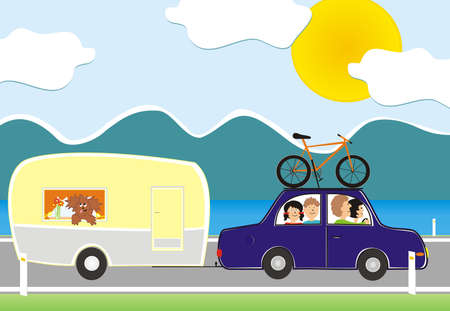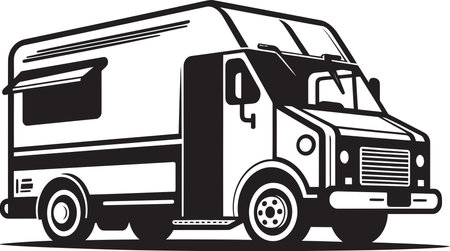Understanding the Legal Landscape
Navigating the rules for overnight parking in a campervan or caravan across the UK can be a proper minefield, especially for those new to the lifestyle or visiting from abroad. The laws and regulations aren’t uniform; they vary significantly between England, Scotland, Wales, and Northern Ireland. It’s essential to have a firm grasp of these differences before you set off, as falling foul of local by-laws or trespassing can result in fines or even having your vehicle moved on.
England and Wales
In both England and Wales, overnight parking is largely governed by a mix of national law and local council by-laws. It’s generally illegal to park overnight on public highways unless explicit permission is given—typically indicated by signage. Car parks owned by councils or private businesses will often have restrictions posted, and many prohibit overnight stays altogether. Wild camping with a campervan or caravan on private land requires the landowner’s consent; without it, you’re trespassing under civil law.
Scotland
Scotland stands apart due to its more permissive approach under the Land Reform (Scotland) Act 2003, which enshrines the right of responsible access to most land. However, this “right to roam” doesn’t automatically extend to vehicles. While wild camping is legal for tents, motorised vehicles are not covered, so parking a campervan overnight still requires either roadside permission or the landowner’s go-ahead. Some areas, like Loch Lomond & The Trossachs National Park, have specific by-laws restricting overnight parking.
Northern Ireland
Northern Ireland operates similarly to England and Wales but tends to be stricter regarding where you can park up overnight. Public car parks rarely permit overnight stays unless specifically designated for motorhomes or caravans. As with elsewhere in the UK, using private land requires prior approval from the owner.
Key Takeaways
The UK’s patchwork of legislation means there’s no one-size-fits-all answer. Your best bet is to plan ahead: check local council websites, look for designated sites and approved stopovers, and always seek permission if you’re unsure about a spot. Respect for local communities and adherence to posted signs will help keep your adventure stress-free—and on the right side of the law.
2. Public Spaces: What’s Allowed and What’s Not
When considering overnight parking in the UK, public spaces come with a range of legal grey areas and strict regulations. Its essential to understand where you can legally park your campervan or caravan for the night, as well as the risks involved if you choose the wrong spot. Here’s a breakdown of the main options and their legal status:
Council-Controlled Car Parks
Many councils across England, Scotland, Wales, and Northern Ireland have their own rules regarding overnight stays in public car parks. Some allow it with restrictions, while others ban it entirely. Always look out for signage detailing any prohibitions or time limits. If unsure, check the relevant council website or contact them directly before parking up.
Common Council Car Park Rules
| Region | Overnight Parking Allowed? | Typical Restrictions |
|---|---|---|
| England (most towns) | No | Fines for overnight stays; barriers on entry |
| Scotland (certain councils) | Sometimes | Permits required; max stay 1-2 nights |
| Wales (coastal areas) | Rarely | No sleeping/camping; vehicle may be towed |
| Northern Ireland (tourist spots) | Occasionally | Designated motorhome bays only; limited availability |
Laybys and Roadside Stops
Laybys are a popular choice for weary travellers needing a quick rest. Legally, stopping in a layby for a short break is fine, but staying overnight is another matter. The law doesn’t specifically prohibit sleeping in your vehicle in laybys unless there is a local bylaw or signage indicating otherwise. However, causing an obstruction or creating waste is strictly forbidden and will attract fines.
Key Layby Considerations
- Motorways: Overnight stays are not permitted in motorway service area laybys.
- A-Roads: Check for signs; some rural locations tolerate discreet overnighting.
- B-Roads: Less monitored but still subject to local council enforcement.
Wild Camping Hotspots: Scotland vs Rest of UK
The laws around wild camping differ dramatically between Scotland and the rest of the UK:
| Location | Status of Wild Camping/Overnight Parking | Key Points to Remember |
|---|---|---|
| Scotland (outside National Parks) | Tolerated (Land Reform Act 2003) | No fires; respect landowners; avoid blocking access tracks |
| Scotland (Loch Lomond & Trossachs NP) | Permit zones only | Book online; heavy penalties for breach of bylaws |
| England, Wales, NI (all public land) | Banned without landowner permission | Trespass laws apply; police may move you on; risk of fines/confiscation of equipment |
Pro Tip:
If you’re determined to enjoy wild camping legally, always seek explicit permission from landowners outside Scotland or stick to designated areas where overnighting is clearly allowed. In all cases, keep noise down, leave no trace, and avoid overstaying your welcome.

3. Private Land and Permissions
When seeking a legal place to park your campervan or caravan overnight in the UK, private land can sometimes offer an ideal solution – but it’s crucial to follow the correct protocols. Not only does this approach help you avoid fines or being moved on, but it also fosters positive relationships with landowners and local communities.
Understanding Private Land Rights
Unlike some countries where wild camping is more freely tolerated, the UK generally requires explicit permission from landowners for overnight stays on private property. This includes fields, driveways, pub car parks, and even certain rural lay-bys that might appear publicly accessible but are privately owned.
How to Seek Permission
Your first step should be to identify the landowner. For pubs or businesses, it’s often as simple as asking at the bar or reception. For farms or rural plots, look for contact details on signage or use resources like the Land Registry or local council records. Approach with courtesy—explain your intentions, duration of stay, and assure them you’ll respect their property.
Etiquette and Best Practice
Always ask before parking and never assume it’s acceptable just because others have done so. Offer something in return: many pub landlords welcome overnight guests if you purchase a meal or drinks. Stick to agreed areas, keep noise low, leave no litter, and absolutely avoid lighting open fires unless expressly permitted. Thank the owner personally before departing.
Common Pitfalls to Avoid
Don’t risk parking without permission—even for ‘just one night’. Local residents may report unfamiliar vehicles. Never block access routes or gates, and beware of sensitive agricultural land (especially during lambing or harvest). Finally, be aware that permissions granted one night do not automatically apply in future; always check again if you return.
Navigating permissions for private land is about respect, clear communication, and understanding British attitudes towards property rights. Done right, it can lead to safe, enjoyable stops—and perhaps even new friendships on the road.
Approved Caravan Sites and Aires
When seeking legal overnight parking for your campervan or caravan in the UK, approved sites and aires provide the most reliable solution. These locations are regulated, safe, and often come with essential amenities. Understanding the types of certified sites, club-run locations, and European-style motorhome stopovers (known as “aires”) will help you plan your journey efficiently and avoid unnecessary trouble.
Certified Caravan and Motorhome Sites
The UK is home to several types of officially recognised camping locations. The most common are:
| Site Type | Description | Booking Required? | Typical Fee Range (per night) |
|---|---|---|---|
| Certified Locations (CLs) | Small sites, usually limited to 5 vans. Affiliated with clubs such as the Caravan and Motorhome Club. | Yes, advisable in peak season | £10–£25 |
| Club Sites | Larger sites operated by major clubs, featuring full facilities (showers, electric hook-up, etc.). | Yes, highly recommended | £15–£40 |
| Aires (Motorhome Stopovers) | Simpler stopovers offering basic facilities or just a safe place to park overnight. More common near ports or tourist towns. | Sometimes – check local rules | Free–£15 |
The Main Clubs: Access and Membership Benefits
The two major organisations for caravan and motorhome enthusiasts in the UK are the Caravan and Motorhome Club and the Camping and Caravanning Club. Membership is generally required to access their certified locations. Members benefit from:
- Access to thousands of club-affiliated sites nationwide
- Discounted rates on pitches and insurance products
- Advance booking privileges during busy periods
- Access to members-only stopover schemes such as “Nightstops” (Camping and Caravanning Club) or “CLs” (Caravan and Motorhome Club)
Aires: The Continental Approach Comes to Britain
Aires are a familiar concept to those who have travelled in France or mainland Europe—simple roadside or town-centre stopovers where self-contained vehicles can rest overnight. In the UK, true aires are less common but growing in number thanks to initiatives by local councils and private landowners.
Tips for Using Approved Sites and Aires
- Always book ahead during school holidays or popular events.
- Check site rules: Some CLs only accept caravans or exclude larger motorhomes.
- Campsites may require proof of membership on arrival.
- Aires tend to be first-come, first-served; arrive early if you can’t pre-book.
- Avoid wild camping where possible; stick to legal stopovers to prevent fines or being moved on by authorities.
- Be prepared for varying facilities: While club sites offer showers and electric hook-ups, aires may only provide water or waste disposal.
Choosing approved caravan sites and aires ensures peace of mind, safety, and compliance with UK laws—making your adventure both enjoyable and above board.
5. Essential Etiquette and Responsible Parking
Best Practice for Overnight Parking in the UK
When stopping overnight with your campervan or caravan in the UK, your conduct plays a crucial role in keeping both local communities and authorities on side. Following essential etiquette is not just courteous—it’s vital for preserving future access and maintaining the good reputation of van dwellers.
Keep Noise to a Minimum
British towns, villages, and countryside are known for their tranquillity. Avoid loud music, shouting, or engine running after dark. If you’re using a generator, check if it’s permitted and always use it sparingly, ideally before 9pm.
Leave No Trace—Manage Your Waste
Littering is a surefire way to attract negative attention. Always take all rubbish with you, including food scraps and cigarette butts. Use proper waste disposal facilities for grey water and chemical toilet waste—never dump them in public spaces or drains. Many campsites and some service stations offer disposal points; plan ahead to use them.
Respect Privacy and Space
Don’t park too close to other vehicles or residential properties. Give locals and fellow travellers room to breathe. If parking near homes or farms, avoid blocking driveways, gates, or access roads—even temporarily.
Be Discreet and Low-Impact
If you’re wild camping (where permitted), keep your footprint small. Avoid putting out awnings, tables, or chairs unless you’re in an official campsite or have explicit permission. Keep windows closed at night to contain noise and light.
Engage with Locals Respectfully
If questioned by residents or authorities, remain polite and explain your plans clearly. A friendly word goes a long way—sometimes simply asking if it’s okay to stay can win you goodwill and useful information about the area.
Prioritise Safety—Yours and Others’
Choose well-lit areas when possible and avoid secluded laybys if you’re alone or feel uncertain. Trust your instincts; if something feels off, move on. Lock doors and secure valuables before settling in for the night.
The Bottom Line
Responsible overnight parking isn’t just about following the law—it’s about upholding a code of respect for places, people, and fellow travellers. By adhering to these best practices, you help ensure that campervanning remains welcome across the UK’s beautiful landscapes.
6. Useful Tools and Resources
Navigating the legalities of overnight parking in the UK can be daunting, especially with ever-changing local restrictions and a patchwork of council regulations. To keep you on the right side of the law and ensure your travels remain hassle-free, it pays to arm yourself with the best digital tools and information sources available.
Essential Apps for Finding Legal Parking
Several well-established apps have become indispensable for UK campervan and caravan travellers. Park4Night is a community-driven favourite, offering up-to-date listings of legal overnight spots, laybys, and campsites. Searchforsites caters specifically to the UK market, with filters for wild camping, pub stopovers, and sites that welcome caravans or larger motorhomes. For those seeking National Trust or Caravan Club locations, their official apps provide direct booking options and facility overviews.
Websites to Bookmark
If you prefer a desktop experience or want more in-depth planning tools, websites like Campercontact and Brit Stops are invaluable. Brit Stops, in particular, offers a directory of pubs, farms, and attractions across the UK where overnight parking is permitted—often free of charge if you patronise their business. Always cross-reference these sources with official council websites to check for recent bylaw changes or new restrictions in your chosen area.
Helplines and Support Networks
If you find yourself uncertain about local parking rules or face an unexpected enforcement notice, don’t panic. The Citizens Advice Bureau (CAB) provides impartial guidance on rights regarding public land access and parking disputes. The Caravan and Motorhome Club, as well as the Camping and Caravanning Club, offer dedicated helplines for members facing issues on the road. Social media groups such as “UK Motorhome Wild Camping” on Facebook are also quick to share recent experiences and warnings about hotspots where enforcement has increased.
Staying Up to Date with Local Restrictions
The regulatory landscape for overnight parking can change rapidly at council level—especially in tourist hotspots or sensitive rural areas. Set up Google Alerts for “overnight campervan parking” along with your intended destination, so breaking news lands directly in your inbox. Many councils publish Temporary Traffic Regulation Orders (TTROs) online; checking these before each trip can spare you an unwelcome knock from enforcement officers.
Your Digital Toolkit: A Final Word
No single tool covers every eventuality in this patchwork system. By combining real-time apps, curated directories, official resources, and active traveller communities, you’ll maximise your chances of finding safe, legal overnight stops—without falling foul of local authorities. Stay vigilant, double-check all information before settling down for the night, and your adventures across Britain will remain both lawful and memorable.


